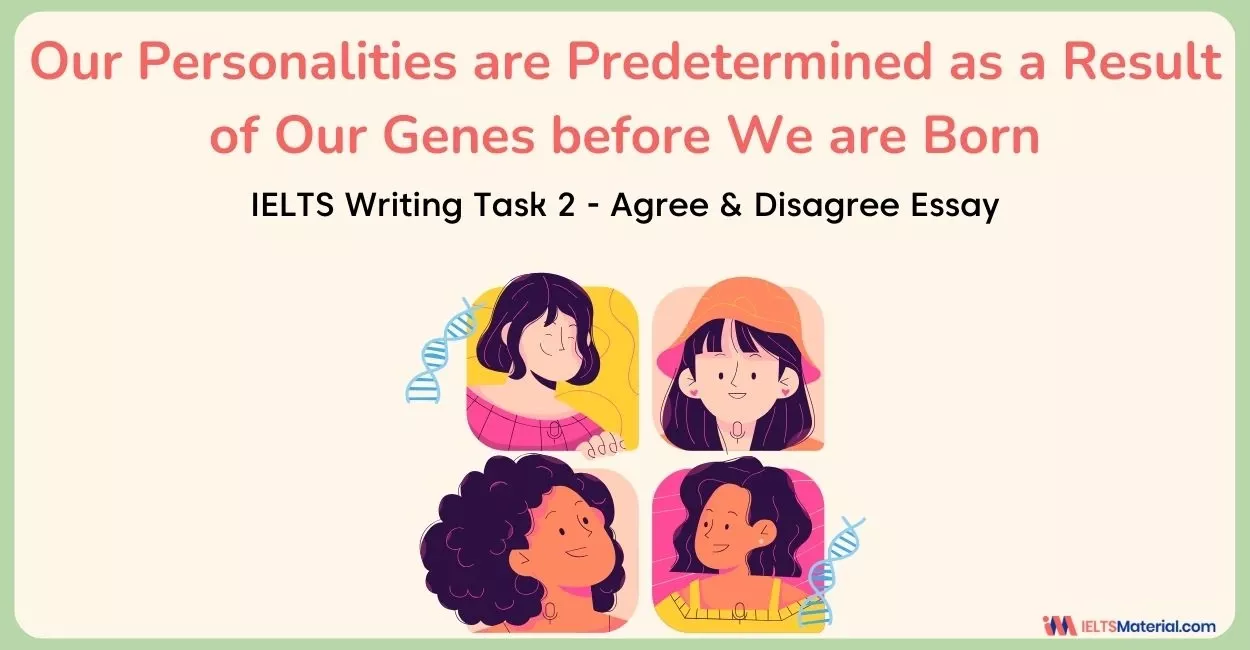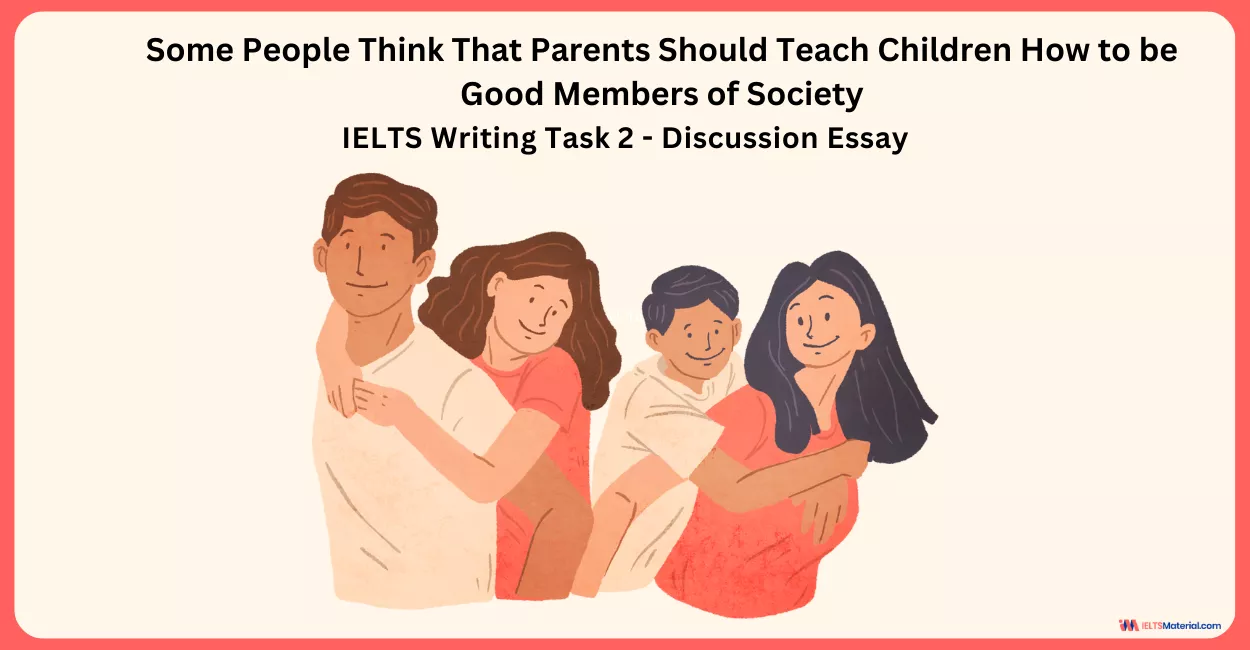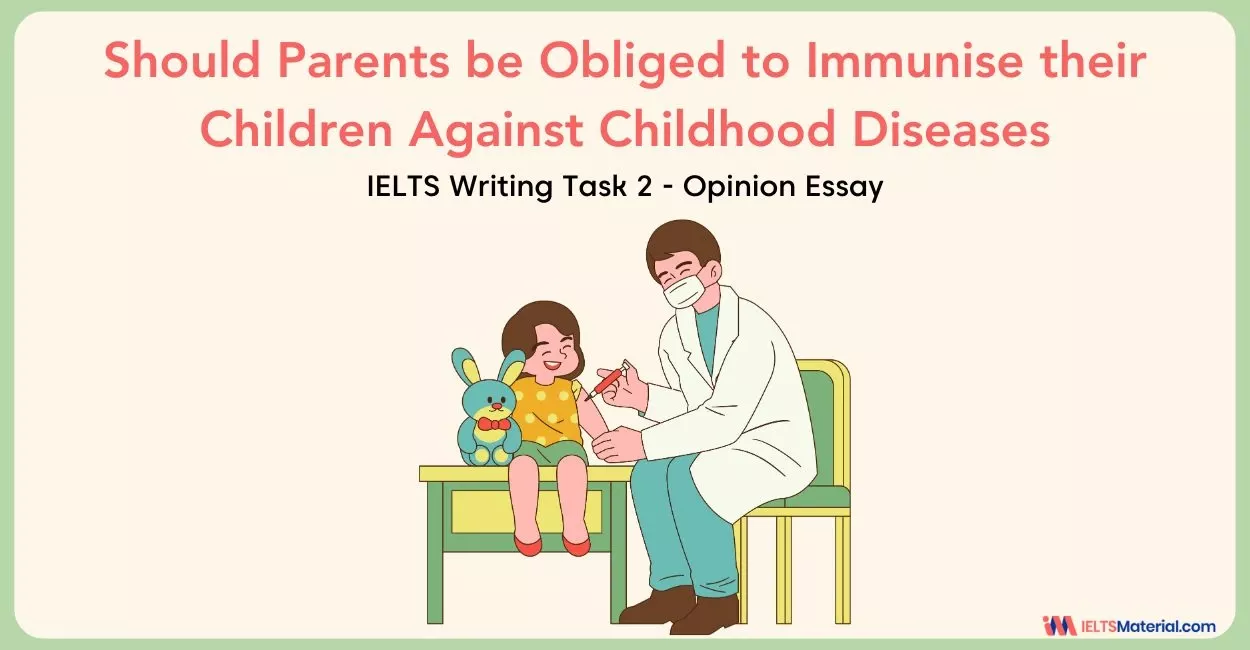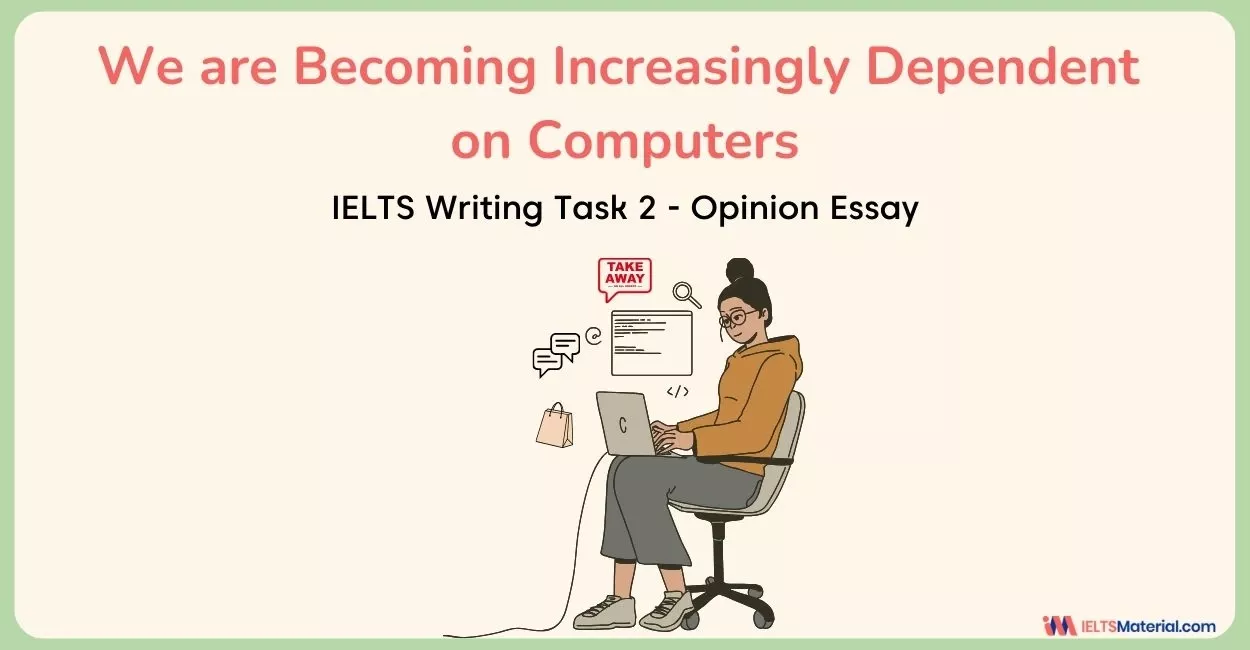Should Parents be Obliged to Immunise their Children Against Childhood Diseases - IELTS Writing Task 2
8 min read
Updated On
-
Copy link
Examine the IELTS opinion essay topic, ‘Should Parents be Obliged to Immunise their Children Against Childhood Diseases’. Find essay outline, sample answers, and vocabulary to help you create a well-rounded answer for an IELTS band score of 7 and above.
Table of Contents
- Essay Question for Should Parents be Obliged to Immunise their Children Against Childhood Diseases
- Outline for IELTS Agree Disagree Essay
- Sample Answers for Should Parents be Obliged to Immunise their Children Against Childhood Diseases IELTS Writing Task 2
- Vocabulary to Use for Should Parents be Obliged to Immunise their Children Against Childhood Diseases IELTS Writing Task 2

Try AI Essay Checker for Instant Band Score
The issue of childhood immunisation sparks heated debate worldwide. While on one hand, some argue that vaccination is a collective responsibility and should be legally enforced, others believe parents should retain the right to decide what is best for their children. In IELTS Writing Task 2, topics related to this debate, like ‘Should Parents be Obliged to Immunise their Children Against Childhood Diseases’, demand a clear position, supported by reasoning and examples.
In this article, we examine sample answers for the IELTS opinion essay on the topic ‘Should Parents be Obliged to Immunise their Children Against Childhood Diseases’, along with an outline and relevant IELTS vocabulary, which is crucial for achieving a high band score.
Essay Question for Should Parents be Obliged to Immunise their Children Against Childhood Diseases
You should spend about 40 minutes on this task.
Should parents be obliged to immunise their children against childhood diseases? Or do individuals have the right to choose not to immunise their children? Give reasons for your answer and include any relevant examples from your own knowledge or experience.
You should write at least 250 words.
Outline for IELTS Agree Disagree Essay
Given below is the outline that will help you to understand how to write IELTS opinion essays.
|
Introduction
Body Paragraph 1
Body Paragraph 2
Body Paragraph 3: Balanced Consideration (optional)
Conclusion
|
Sample Answers for Should Parents be Obliged to Immunise their Children Against Childhood Diseases IELTS Writing Task 2
Each sample essay given below addresses the IELTS Writing Task 2 topic, 'Should Parents be Obliged to Immunise their Children Against Childhood Diseases'. Therefore, to reach your desired writing band score, make sure you carefully review the three IELTS Band 9 essay samples below.
Should Parents be Obliged to Immunise their Children Against Childhood Diseases - Sample Answer 1
Some people argue that parents must be legally compelled to vaccinate their children, while others maintain that such decisions should remain a matter of individual choice. In my view, parents should not be forced into immunisation, as it infringes upon personal freedom and may undermine trust in healthcare systems.
Firstly, mandatory vaccination policies can be seen as a violation of parental rights. Parents are the primary caregivers and have the moral and legal authority to decide on their children’s well-being. Forcing them to vaccinate could lead to resentment and even resistance. For example, in countries where vaccination is compulsory, underground movements often emerge, spreading misinformation and creating more hesitancy rather than less. Respecting parental autonomy, therefore, may encourage dialogue rather than coercion.
Secondly, while vaccines are generally safe, some individuals may have legitimate medical or ethical reasons to avoid them. Children with severe allergies or compromised immune systems might face adverse reactions. Moreover, in diverse societies, some communities hold cultural or religious objections to vaccination. Allowing flexibility acknowledges these differences and fosters inclusivity. For instance, certain indigenous groups in Canada have been granted exemptions due to traditional beliefs, striking a balance between public health and cultural respect.
In conclusion, while immunisation is undoubtedly important, it should not be legally enforced. Instead, governments should focus on awareness campaigns and voluntary participation, ensuring both public health and individual rights are respected.
Don’t wait to solve your IELTS queries?
Book IELTS online classes & discuss with the IELTS experts NOW!
Should Parents be Obliged to Immunise their Children Against Childhood Diseases - Sample Answer 2
The question of whether parents should be legally required to vaccinate their children has generated strong opinions. While some believe immunisation should be a matter of personal choice, I argue that it ought to be obligatory to protect public health and future generations.
To begin with, compulsory vaccination prevents the outbreak of deadly childhood diseases. Illnesses such as measles, polio, and whooping cough once caused countless fatalities, but widespread immunisation has reduced them dramatically. If parents are allowed to opt out, herd immunity can collapse, putting vulnerable populations such as infants and the elderly at risk. For example, recent measles outbreaks in Europe were linked to declining vaccination rates, demonstrating the dangers of leaving immunisation optional.
Moreover, governments have a moral duty to safeguard children’s health. Young children cannot make medical decisions for themselves, so it falls upon society to ensure they are adequately protected. Vaccination is a low-cost, highly effective measure that prevents suffering and reduces healthcare expenses. For instance, the eradication of smallpox through mandatory vaccination programmes saved millions of lives and vast sums of money in healthcare costs.
It is true that some parents have expressed concerns regarding the safety of vaccines. However, numerous scientific studies have repeatedly demonstrated with consistency that vaccines that have been approved are both safe to use and also very effective.
In conclusion, immunisation should be obligatory because it prevents disease outbreaks and protects vulnerable groups. Although parents may feel their rights are restricted, the greater benefit to public health outweighs individual concerns.
Join a FREE online webinar to learn how to deal with IELTS essays for success!
Should Parents be Obliged to Immunise their Children Against Childhood Diseases - Sample Answer 3
In today’s era, the frailing and plummeting health and health indexes respectively are dwindling to a harrowing extent. In such a case, some people side with an opinion that it should be obligatory for all the parents to have their children vaccinated, while significant others opine that it is a subjective choice to go for the vaccination of their children. I find myself agreeing with the former statement and in the paragraphs to come, I shall proffer my viewpoints on the topic.
The dip in the health statuses is a very common and horrendous situation these days, with novel viruses and pathogens coming into the picture. Humanity is going through a ghastly time where every single individual seems to be in the clutch of perils. Therefore, it becomes all the more significant for the people to bolster their health right from the beginning of their lives and ensure that their children are vaccinated and immunised against various diseases that could indent their health in the times to come. For instance, various menacing viruses and pathogens in the past have been eradicated due to vaccination and this way, various causes of epidemics and plagues are nowhere to be found today.
Talking about the added advantages of early immunisation, it is significant from various other aspects such as economic purview as well. For instance, getting a child vaccinated against the perilous pathogens can help him/her ward off the economic breakdown that s/he might suffer in the future due to enervated immunity, and not getting vaccinated could cost his/her family members heavily not only from the viewpoint of money spent on the treatment but also their emotional drain in the prophylactic processes. Adding to that, getting vaccinated might help one to steer clear from getting attacked by pathogens of similar nature. For example, the Covid-19 vaccine helped people tackle well from the mutated strand of the virus- Omicron. Hence, this makes immunisation substantially quintessential and the earlier it gets done, the better.
Though some might say that immunising children is seemingly pedantic and finicky, one must not forget that prevention is better than the cure.
Therefore, we may state that vaccination and immunisation of children should be made compulsory for the parents, and there is no second way for this.
Grab our Extensive Bundle for IELTS Writing (Academic) & ease your writing worries!
Vocabulary to Use for Should Parents be Obliged to Immunise their Children Against Childhood Diseases IELTS Writing Task 2
Here is a list of advanced vocabulary word list for IELTS, related to the topic ‘Should Parents be Obliged to Immunise their Children Against Childhood Diseases’, as used in the example answers.
|
Word/Phrase |
Meaning |
Example Sentence |
|---|---|---|
|
Frailing |
becoming weak or feeble |
His frailing health prevented him from continuing his usual activities. |
|
Plummeting |
falling or dropping quickly in amount or value |
House prices are plummeting due to the economic downturn. |
|
Dwindling |
gradually diminishing in size, amount, or strength |
The dwindling number of volunteers has affected the charity’s projects. |
|
Harrowing |
extremely distressing or upsetting |
The survivors shared harrowing accounts of the disaster. |
|
Obligatory |
required by a rule, law, or custom |
Wearing helmets is obligatory for motorcyclists in most countries. |
|
Pathogens |
microorganisms that can cause disease |
Scientists are researching ways to neutralise airborne pathogens. |
|
Ghastly |
extremely unpleasant or horrifying |
The film was so ghastly that many viewers left the cinema early. |
|
Peril |
serious and immediate danger |
The hikers ignored the peril of climbing during a storm. |
|
Enervated |
drained of energy or vitality |
After the long meeting, she felt enervated and unable to concentrate. |
|
Pedantic |
excessively concerned with minor details or rules |
The teacher’s pedantic remarks often discouraged creative thinking. |
|
Herd immunity |
resistance to disease in a population due to high vaccination rates |
Herd immunity protects those who cannot receive vaccines themselves. |
|
Outbreak |
a sudden occurrence of disease |
A measles outbreak spread rapidly in areas with low vaccination rates. |
|
Safeguard |
to protect from harm |
Governments must safeguard children’s health through preventive measures. |
|
Autonomy |
the right to make one’s own decisions |
Respecting parental autonomy helps build trust in healthcare systems. |
|
Coercion |
forcing someone to act through pressure |
Coercion in vaccination policies may create backlash among citizens. |
|
Infringe |
to limit or violate rights |
Mandatory immunisation could be seen as infringing on parental rights. |
|
Eradication |
complete destruction of something |
The eradication of smallpox was a landmark achievement of global health. |
|
Adverse reaction |
a harmful or unwanted effect from medicine |
Doctors carefully monitor children with allergies to avoid adverse reactions. |
|
Inclusivity |
the practice of including all groups fairly |
Exemptions for cultural reasons demonstrate inclusivity in health policy. |
|
Moral duty |
responsibility based on ethical principles |
Governments have a moral duty to prevent avoidable childhood deaths. |
To conclude, the immunisation debate highlights the clash between public health priorities and individual freedoms. You can score highly by presenting both sides clearly, using strong reasoning, and supporting your ideas with real-world examples in IELTS Writing Task 2. So, go through sample answers of recent IELTS topics in Writing Task 2, take IELTS Writing practice tests regularly, and use precise, academic vocabulary to demonstrate lexical sophistication and push your essay into the Band 7+ range.
Useful Links:
- Some People Say that Young People Should be Encouraged to Leave Home - IELTS Writing Task 2
- Some people say that anyone can create art such as painting, poetry, music and so on - IELTS Opinion Essay
- Do You Think Extra-Curricular Activities are Important in a Student’s Life - IELTS Writing Task 2
- The Position of Women in Society has Changed Markedly in the Last Twenty Years - IELTS Writing Task 2
- 15 Synonyms to Express ‘My Opinion' in IELTS
- Should I Give My Opinion in IELTS Writing Task 2?
- Best IELTS Writing Task 2 Tips for Achieving Band 9
Practice IELTS Writing Task 2 based on Essay types

Start Preparing for IELTS: Get Your 10-Day Study Plan Today!
Explore other Opinion Essays



Recent Articles

Haniya Yashfeen


Prity Mallick

Kasturika Samanta





Post your Comments